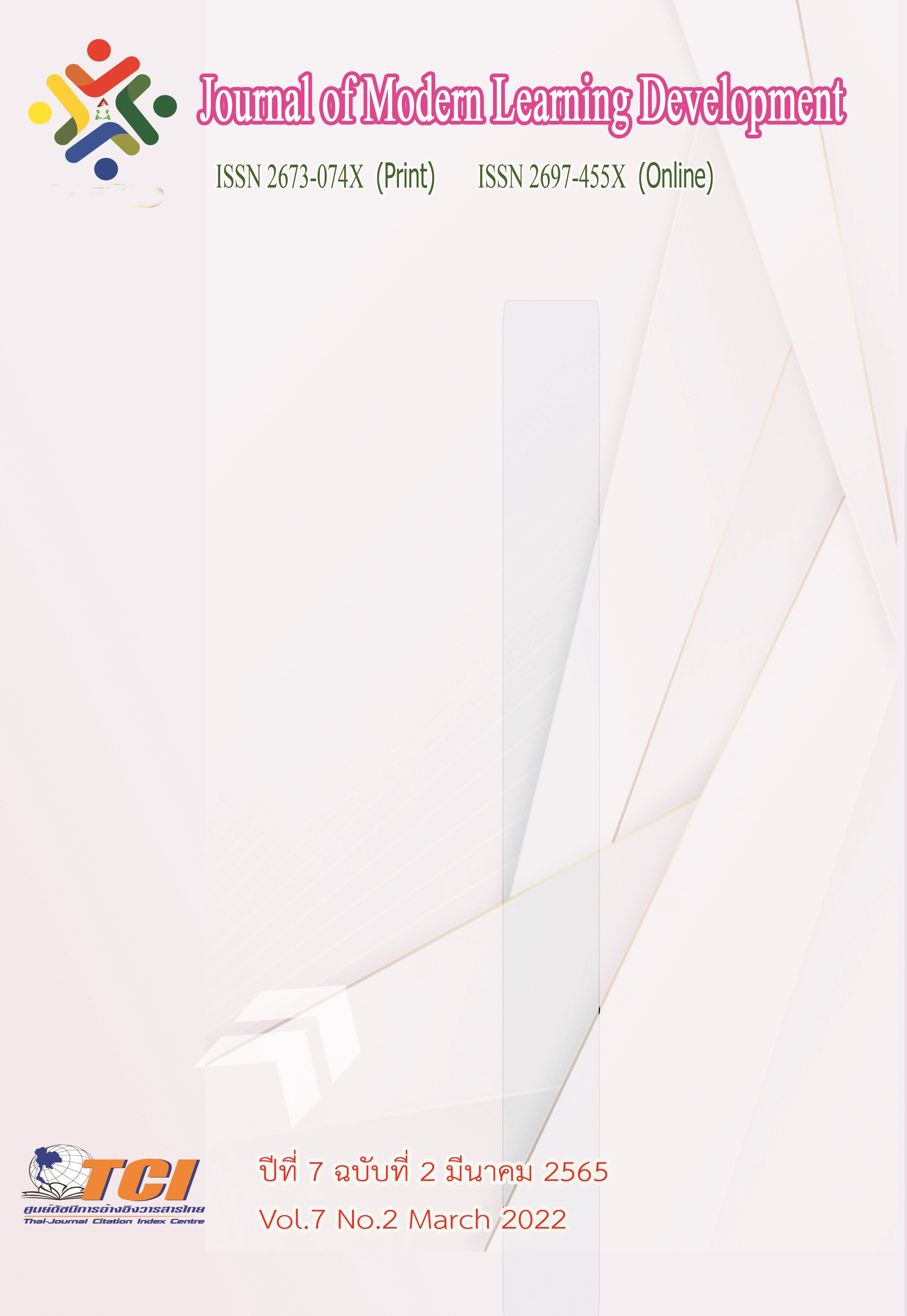Quotient Factors Affecting Job Success of Personnel of Provincial Commercial Officer in Thailand
Main Article Content
Abstract
Therefore, the purpose of this research is study about quotient factors effecting job success. The sample was 192 provincial commercial officers by stratified random sampling of provincial offices and used a questionnaire as tools. The statistics use to analyze the data include percentage, mean, standard deviation, t-test, F-test (ANOVA and MANOVA), multiple correlation analysis, simple regression analysis, and multiple regression analysis.
A result of this study was found in the following aspects.
The results showed that provincial commercial officers are high-level opinions about the overall quotient factors. When considered on a case-by-case quotient aspects, they are at high level in all quotients and high level of opinion about overall job success.When considering each job successful aspect at a high level are two aspects namely work role success and interpersonal success. At a moderate level of job success aspect are two aspects, namely financial success and hierarchical success.
Provincial commercial officers who are different in gender, in education level, job experience and the working groups. There are opinions about the overall and all aspects of quotient factors are not different.
From the correlation and effect analysis, it was found that 1) Emotional quotient factors correlated and positively effect on overall job success of financial success 2) Moral quotient factors correlated and positively effect on job success of work role success and Interpersonal success 3) Adversity quotient factors correlated and positively effect on job success of work role success and 4) Creativity quotient factors correlated and positively effect on job success, work role success, financial success, and hierarchical success.
In summary, the quotient factors correlated and positively effect on job success. Therefore, the Ministry of Commerce executives should focus on creativity quotient factors, emotional quotient factors, moral quotient factors and adversity quotient factors.
Article Details
References
เจนรพ เบี้ยฟู. (2561). ความฉลาดทางอารมณ์ ความสนิทสนมกับเพื่อนร่วมงาน แรงบันดาลใจ การสื่อสารและความก้าวหน้าในอาชีพที่ส่งผลต่อความสำเร็จในการทำงานของพนักงานบริษัทเอกชน ในเขตสีลมกรุงเทพมหานคร. ค้นคว้าอิสระปริญญา บริหารธุรกิจมหาบัณฑิต. บัณฑิตมหาวิทยาลัย : มหาวิทยาลัยกรุงเทพ.
ณัชชา เพชรสากล. (2554). บุคลิกภาพเชิงรุก ความสามารถในการเผชิญและฟันฝ่าอุปสรรคกับการรับรู้ความสำเร็จ ในอาชีพของพนักงานขายทางโทรศัพท์ : กรณีศึกษาบริษัทประกันวินาศภัยแห่งหนึ่ง. วิทยานิพนธ์ปริญญาศิลปศาสตรมหาบัณฑิต. บัณฑิตมหาวิทยาลัย : มหาวิทยาลัยธรรมศาสตร์.
ทิชากร รอดแสง และ ภาริณี เพชรสว่าง. (2561). ความสัมพันธ์ระหว่างสัมพันธภาพระหว่างบุคคลกับประสิทธิภาพ
ในการทำงานของพนักงานโรงแรมเซ็นทาราแกรนด์ เซ็นทรัลพลาซา ลาดพร้าว กรุงเทพมหานคร. การประชุม
นำเสนอผลงานวิจัยระดับบัณฑิตศึกษา ครั้งที่ 13 ปีการศึกษา 2561. 340-351.
ทิพย์ประภา พิศาลกิตติคุณ. (2558). ความฉลาดทางอารมณ์ที่มีผลต่อประสิทธิภาพการปฏิบัติงาน : กรณีศึกษาผู้ปฏิบัติงานฝ่ายควบคุมระบบกำลังไฟฟ้า การไฟฟ้าฝ่ายผลิตแห่งประเทศไทย. วิทยานิพนธ์ปริญญารัฐประศาสนศาสตรมหาบัณฑิต. บัณฑิตมหาวิทยาลัย : มหาวิทยาลัยศิลปากร.
ทรรศนีย์ เปี่ยมคล้า. (2554). รูปแบบภาวะผู้นำ เชาว์อารมณ์และความสามารถในการเผชิญและฝ่าฟันอุปสรรคของปลัดอำเภอและปลัดองค์การบริหารส่วนตำบลในจังหวัดนครปฐม. วิทยานิพนธ์ปริญญารัฐประศาสนศาสตรมหาบัณฑิต. บัณฑิตมหาวิทยาลัย : มหาวิทยาลัยศิลปากร.
นิดา แซ่ตั้ง. (2555). ความฉลาดทางอารมณ์ และความฉลาดในการเผชิญอุปสรรคที่มีผลต่อการทำงานของพนักงาน
ธนาคารพาณิชย์ในกรุงเทพมหานคร. วิทยานิพนธ์ปริญญาบริหารธุรกิจมหาบัณฑิต. บัณฑิตมหาวิทยาลัย : มหาวิทยาลัยศรีนครินทร์วิโรฒ.
บุญชม ศรีสะอาด. (2553). การวิจัยเบื้องต้น. กรุงเทพมหานคร: สุวิริยาสาส์น.
พิชญาภา ยืนยาว. (2560). ปัจจัยความฉลาดที่ส่งผลต่อคุณลักษณะที่พึงประสงค์ของนักศึกษาหลักสูตร ครุศาสตรบัณฑิต มหาวิทยาลัยราชภัฏนครปฐม. Veridian E-Journal, Silpakorn University ฉบับมนุษยศาสตร์ สังคมศาสตร์ และศิลปะ. 10 (3), 1596 – 1612
พชร สุลักษณ์อนวัช. (2559). ความสำเร็จในอาชีพ เชาวน์อารมณ์ และความพึงพอใจในชีวิต โดยมีความภาคภูมิใจในตนเองเป็นตัวแปรสื่อ ของพนักงานระดับปฏิบัติการ กรณีศึกษา : บริษัทโทรคมนาคมแห่งหนึ่งใน
กรุงเทพมหานคร.วิทยานิพนธ์ปริญญาศิลปศาสตรมหาบัณฑิต.บัณฑิตมหาวิทยาลัย : มหาวิทยาลัยธรรมศาสตร์.
พรทิพย์ นาคพงศ์พันธ์. (2551). ความฉลาดทางจริยธรรม ความฉลาดทางความคิดสร้างสรรค์และความสามารถในการเผชิญปัญหาและฟันฝ่าอุปสรรคที่ส่งผลต่อความสำเร็จในอาชีพ กรณีศึกษา : บริษัทเอกชนแห่งหนึ่ง. วิทยานิพนธ์ปริญญาศิลปศาสตรมหาบัณฑิต. บัณฑิตมหาวิทยาลัย : มหาวิทยาลัยธรรมศาสตร์.
วิชุดา จิวประพันธ์. (2553). ปัจจัยที่มีผลต่อความสำเร็จในการปฏิบัติงานของพนักงานศูนย์ปฏิบัติการเอกสารสัญญาธนาคารกรุงเทพ จำกัด มหาชน. ค้นคว้าอิสระปริญญา บริหารธุรกิจมหาบัณฑิต. บัณฑิตมหาวิทยาลัย: มหาวิทยาลัยศิลปากร.
ศิวพร เสลาหลัก. (2558). การรับรู้ภาวะผู้นำการเปลี่ยนแปลง และความคิดสร้างสรรค์ที่ส่งผลต่อประสิทธิผล
การปฏิบัติงานเชิงนวัตกรรมของพนักงานธนาคารเพื่อการเกษตรและสหกรณ์การเกษตร สังกัด
สำนักงานจังหวัดราชบุรี. วิทยานิพนธ์ปริญญาศิลปศาสตรมหาบัณฑิต. บัณฑิตมหาวิทยาลัย : มหาวิทยาลัยศิลปากร.
สำนักงานปลัดกระทรวงพาณิชย์. (2562). เกี่ยวกับกระทรวง.ออนไลน์. สืบค้นเมื่อ 12 ตุลาคม 2562. แหล่งที่มา: www.moc.go.th
สมมาศ พลเยี่ยม. (2552). ผลกระทบของความฉลาดทางอารมณ์ที่มีต่อประสิทธิภาพการทำงานของพนักงาน
ธนาคารออมสิน ภาค 9. วิทยานิพนธ์ปริญญาบริหารธุรกิจมหาบัณฑิต. บัณฑิตมหาวิทยาลัย : มหาวิทยาลัยมหาสารคาม.
Gattiker, U. E., & Larwood, L. (1986). Subjective Career Success: A Study of Managers and
Support Personnel. Journal of Business and Psychology, 1 (2), 78-94.
Karebey, C. N., Aliogullari, Z. D. (2018). The impact of ethical leadership on member’s creativity :and career success: the mediating role of leader-member exchange. Research Journal of Business and Management (RJBM). 5 (3), 202-211.
Por, J., Barriball, L., Fitzpatrick, J., & Roberts, J. (2011). Emotional intelligence: It’s relationship to stress, coping, well-being and professional performance in nursing students. Nurse education today. 31 (8), 855-860.
Stoltz, P. G. (1997). Adversity quotient: Turning obstacles into opportunities. New York:
John Wiley and Sons.


